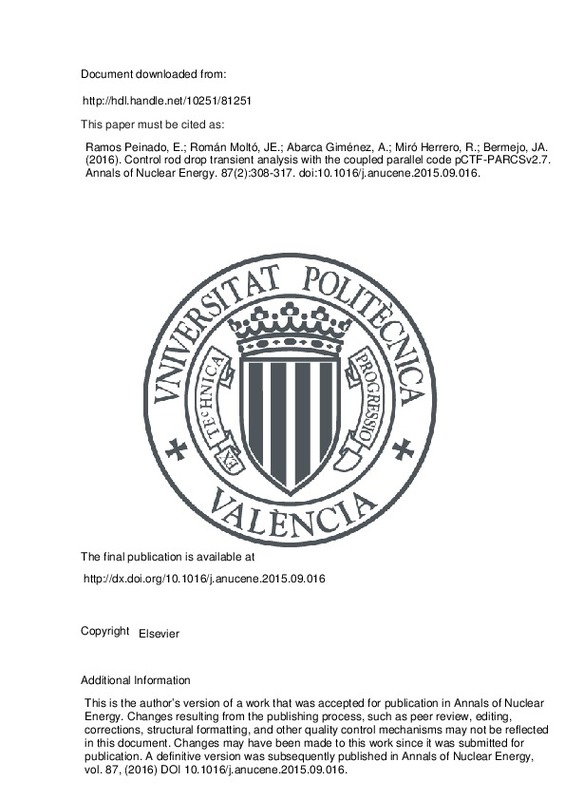Ramos Peinado, E.; Román Moltó, JE.; Abarca Giménez, A.; Miró Herrero, R.; Bermejo, JA. (2016). Control rod drop transient analysis with the coupled parallel code pCTF-PARCSv2.7. Annals of Nuclear Energy. 87(2):308-317. https://doi.org/10.1016/j.anucene.2015.09.016
Por favor, use este identificador para citar o enlazar este ítem: http://hdl.handle.net/10251/81251
|
Título:
|
Control rod drop transient analysis with the coupled parallel code pCTF-PARCSv2.7
|
|
Autor:
|

 Ramos Peinado, Enrique
Ramos Peinado, Enrique

 Román Moltó, José Enrique
Román Moltó, José Enrique
 Abarca Giménez, Agustín
Abarca Giménez, Agustín

 Miró Herrero, Rafael
Bermejo, Juan A.
Miró Herrero, Rafael
Bermejo, Juan A.
|
|
Entidad UPV:
|
Universitat Politècnica de València. Escuela Técnica Superior de Ingenieros Industriales - Escola Tècnica Superior d'Enginyers Industrials
Universitat Politècnica de València. Escola Tècnica Superior d'Enginyeria Informàtica
Universitat Politècnica de València. Instituto de Seguridad Industrial, Radiofísica y Medioambiental - Institut de Seguretat Industrial, Radiofísica i Mediambiental
|
|
Fecha difusión:
|
|
|
Resumen:
|
In order to reduce the response time when simulating large reactors in detail, a parallel version of the
thermal–hydraulic subchannel code COBRA-TF (CTF) has been developed using the standard Message
Passing Interface ...[+]
In order to reduce the response time when simulating large reactors in detail, a parallel version of the
thermal–hydraulic subchannel code COBRA-TF (CTF) has been developed using the standard Message
Passing Interface (MPI). The parallelization is oriented to reactor cells, so it is best suited for models consisting
of many cells. The generation of the Jacobian matrix is parallelized, in such a way that each processor
is in charge of generating the data associated with a subset of cells. Also, the solution of the linear
system of equations is done in parallel, using the PETSc toolkit. With the goal of creating a powerful tool
to simulate the reactor core behavior during asymmetrical transients, the 3D neutron diffusion code
PARCSv2.7 (PARCS) has been coupled with the parallel version of CTF (pCTF) using the Parallel Virtual
Machine (PVM) technology. In order to validate the correctness of the parallel coupled code, a control
rod drop transient has been simulated comparing the results with the real experimental measures
acquired during an NPP real test.
2015 Elsevier Ltd. All rights reserved.
[-]
|
|
Palabras clave:
|
Sub-channel simulation
,
Parallel computing
,
PETSc
,
COBRA-TF
,
PARCSv2.7
|
|
Derechos de uso:
|
Reserva de todos los derechos
|
|
Fuente:
|
Annals of Nuclear Energy. (issn:
0306-4549
)
|
|
DOI:
|
10.1016/j.anucene.2015.09.016
|
|
Editorial:
|
Elsevier
|
|
Versión del editor:
|
http://dx.doi.org/10.1016/j.anucene.2015.09.016
|
|
Código del Proyecto:
|
info:eu-repo/grantAgreement/UPV//PAID-05-12/
info:eu-repo/grantAgreement/UPV//PAID-05-11-2810/
info:eu-repo/grantAgreement/MINECO//TIN2013-41049-P/ES/EXTENSION DE LA LIBRERIA SLEPC PARA POLINOMIOS MATRICIALES, FUNCIONES MATRICIALES Y ECUACIONES MATRICIALES EN PLATAFORMAS DE COMPUTACION EMERGENTES/
info:eu-repo/grantAgreement/MINECO//ENE2012-34585/ES/DESARROLLO DE UNA PLATAFORMA MULTIFÍSICAS DE ALTAS PRESTACIONES PARA SIMULACIONES TERMOHIDRAULICO-NEUTRÓNICAS EN INGENIERIA NUCLEAR/
|
|
Descripción:
|
This is the author’s version of a work that was accepted for publication in Annals of Nuclear Energy. Changes resulting from the publishing process, such as peer review, editing, corrections, structural formatting, and other quality control mechanisms may not be reflected in this document. Changes may have been made to this work since it was submitted for publication. A definitive version was subsequently published in Annals of Nuclear Energy, vol. 87, (2016) DOI 10.1016/j.anucene.2015.09.016.
|
|
Agradecimientos:
|
This work has been partially supported by the Universitat Politecnica de Valencia under Projects COBRA_PAR (PAID-05-11-2810) and OpenNUC (PAID-05-12), and by the Spanish Ministerio de Economa y Competitividad under Projects ...[+]
This work has been partially supported by the Universitat Politecnica de Valencia under Projects COBRA_PAR (PAID-05-11-2810) and OpenNUC (PAID-05-12), and by the Spanish Ministerio de Economa y Competitividad under Projects SLEPc-PFE (TIN2013-41049-P) and NUC-MULTPHYS (ENE2012-34585). The authors would like to acknowledge the technical support provided by CNAT and IBERDROLA GENERACION S.A. for the realization of this work.
[-]
|
|
Tipo:
|
Artículo
|







![[Cerrado]](/themes/UPV/images/candado.png)


